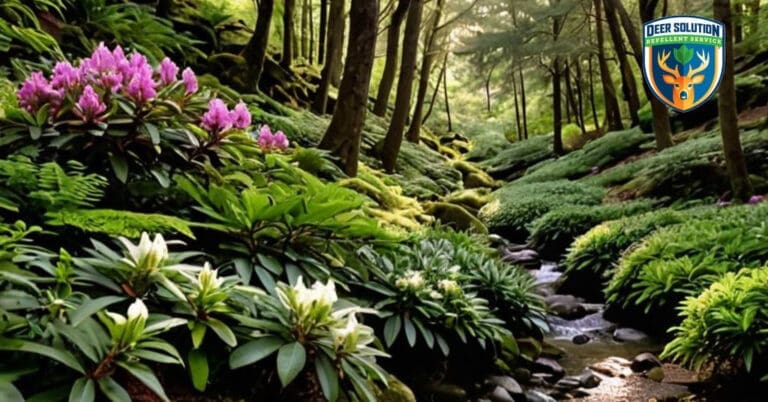Rhododendrons are a beloved addition to many gardens, but their appeal can also attract unwanted visitors – deer. These majestic shrubs, with their vibrant blooms and lush foliage, are a tempting treat for deer, leading to potential damage and frustration for gardeners. Understanding whether deer eat rhododendrons and implementing eco-friendly deterrence strategies is crucial for maintaining a thriving and deer-resistant landscape.
Do Deer Eat Rhododendrons?
The short answer is yes, deer can and often do eat rhododendrons. While rhododendrons are not typically a deer’s first choice, they are not entirely deer-resistant. Deer may browse on the leaves, buds, and even the bark of rhododendrons, particularly during times of food scarcity or when other preferred plants are unavailable.
However, it’s important to note that not all rhododendron varieties are equally appealing to deer. Some species, such as the Pacific Rhododendron (Rhododendron macrophyllum), are more resistant to deer browsing due to their thick, leathery leaves and bitter taste. Additionally, deer tend to avoid rhododendrons with highly fragrant flowers or those with hairy or fuzzy leaves.
Eco-Friendly Deer Deterrence Strategies
While deer may occasionally nibble on rhododendrons, there are eco-friendly strategies that can help deter them from causing significant damage to your garden:
- Repellent Sprays: Consider using an all-natural, eco-friendly repellent spray specifically designed to deter deer. These sprays typically contain a combination of plant-based ingredients that create an unpleasant taste or smell, deterring deer from browsing on treated plants.
- Companion Planting: Incorporate plants that deer tend to avoid, such as lavender, marigolds, or herbs like rosemary and sage, around your rhododendrons. The strong scents and flavors of these plants can act as a natural deterrent.
- Physical Barriers: While not a permanent solution, temporary physical barriers like netting or fencing can provide short-term protection for your rhododendrons during peak browsing seasons or until the plants mature and become less susceptible to deer damage.
It’s essential to remember that deer are adaptable and may eventually become accustomed to certain deterrents. Rotating and combining different eco-friendly strategies can help maximize their effectiveness in protecting your rhododendrons and overall landscape.
Embracing Eco-Friendly Deer Management
At Deer Solution, we understand the delicate balance between protecting your landscape and respecting the natural environment. Our proprietary all-natural repellent service is tailored to deter deer from damaging your prized rhododendrons and other plants, while aligning with eco-friendly principles. Our certified deer damage experts work closely with you to develop a personalized protection plan, ensuring a sustainable and effective approach to deer management.








